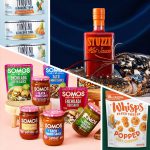Video: Indian Food Brands Spice Up Expo East 2015
Googling “Indian food in America” yields some rather disheartening results. From The Washington Post’s “Why delicious Indian food is surprisingly unpopular in the U.S.” to The Huffington Post’s “Is Indian food finally…trendy?!” the top results seem to paint a picture of a high barrier to enter the CPG market on a platform of samosa and ghee. According to The Washington Post’s story, Indian ingredients for cooking at home only account for 1.2 percent of the ethnic market share.
Beyond that, very few of the “Indian” food brands in an American grocery store would be accepted and even recognized in India. What the U.S. has — as with many foreign cuisines — is Indian food adapted for the American palate.
The news isn’t all bad though. Just this year Tasty Bite, which produces predominantly Indian inspired dishes, was acquired for an undisclosed sum by Kagome company of Japan. There’s also been a rise in new Indian-inspired products, including Whole Foods Market private label naan chips, Padma Lakshmi’s frozen rice dishes and Bandar Food’s lentil crisps.
So what is the future of Indian food in America’s grocery stores? Project NOSH spoke with a pair entrepreneurs at Natural Products Expo East to try to figure it out. Maya Kaimal has been in grocery stores nationwide for well over ten years with her eponymous line of sauces and snacks, while Shiraz Noor is just entering the market as a co-founder of The Chaat Company.
Our key takeaway: while both Maya Kaimal Fine Indian Foods and The Chaat Company have a laser focus on quality, the two differ in an approach to authenticity and growth structure.
Maya Kaimal: Finding the Consumers Who Appreciate Your Point of View
Maya Kaimal is strong, confident entrepreneur who knows exactly who she and her brand are. Born to an Indian father and American mother, Kaimal is an accomplished cook who won the Julia Child Award for best first book for Curried Flavors: Family Recipes from South India.
When she entered the grocery marketplace, Kaimal had an strategic plan. Rather than going to the “ghetto-ized” ethnic food aisle, she entered in the Specialty section as a refrigerated sauce line. Merchandised next to exotic cheeses and higher end products, her line was given a sheen of “freshness” and exposure to more adventurous shoppers who were used to paying premium prices.
Since establishing her brand with the fresh sauces, Kaimal has since diversified the line, moving into shelf stable sauces, a spicy ketchup and, most recently, a snack line of chickpea chips and naan chips. The brand’s route was to start in very traditional applications and flavors and only then branch out into products that are perhaps more accessible.
While she sees the path to building a successful Indian food brand as tricky and slower than other ethnic cuisines, Kaimal does believe there’s a future for the cuisine. At the same time, staying true to her heritage and creating items she’s passionate about are vitally important to the brand identity.
The Chaat Company: A Global Food Company for Millennials
Yes, Chaat is an Indian term (meaning savory snacks). But don’t call the Chaat company an Indian food company. While its first product of savory yogurt sold with lentil puffs certainly is inspired by the flavors of India (both he and his co-founder’s Anshu Dua have Indian ancestry but were born or raised in the U.S.), co-founder Shiraz Noor believes that there never will be a year of Indian cuisine.
In an interview with Project NOSH, Noor attributed this to a misrepresentation and misunderstanding of Indian food in America. He says that the main interaction most Americans have had with the cuisine is at lower quality buffet restaurants offering heavy dishes that have sat out for hours. With such a history, it’s no wonder that Americans are wary.
That said, Noor and Dua are undeterred. As a Millennial himself, Noor says that the generation cares less about a company’s authenticity and more about its transparency. It’s about who is making your product, where it came from and what it’s made from.
One visit to The Chaat Company’s website and you’ll see what exactly he means. There’s not a mention of India anywhere; instead there’s reference to grass-fed milk, probiotics, non-GMO ingredients, convenience and the fact the snack is gluten-free with no added sugar.
Blending Cultures and Creating Unique Brands
While Maya Kaimal Fine Indian Foods and The Chaat company have slightly different feelings on how to build a successful Indian influenced brand, where the two both agree is on emphasizing quality and strategic growth — and that’s the kind of focus that is important for any food entrepreneur.












